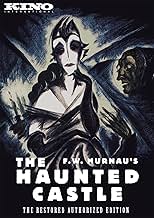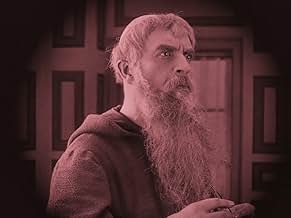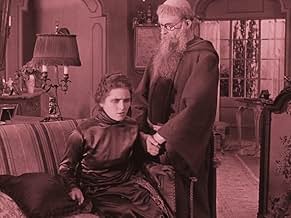NOTE IMDb
6,1/10
2,2 k
MA NOTE
La baronne de Safferstätt, dont le premier mari a été assassiné, se rend dans un château avec des amis pour une partie de chasse. Là, elle retrouve son beau-frère, soupçonné du meurtre.La baronne de Safferstätt, dont le premier mari a été assassiné, se rend dans un château avec des amis pour une partie de chasse. Là, elle retrouve son beau-frère, soupçonné du meurtre.La baronne de Safferstätt, dont le premier mari a été assassiné, se rend dans un château avec des amis pour une partie de chasse. Là, elle retrouve son beau-frère, soupçonné du meurtre.
- Réalisation
- Scénario
- Casting principal
Lulu Kyser-Korff
- Centa V. Vogelschrey - von Vogelschrey's Frau
- (as L. Kyser-Korff)
Lothar Mehnert
- Graf Johann Oetsch
- (as Lotar Mehnert)
Victor Bluetner
- Der Pater Faramund
- (as Victor Blütner)
Walter Kurt Kuhle
- Ein Diener
- (as Walter Kurt-Kuhle)
Loni Nest
- Kleines Mädchen
- (non crédité)
Ursula Nest
- Zweites Kleines Mädchen
- (non crédité)
Georg Zawatzky
- Küchenjunge
- (non crédité)
Avis à la une
"The Haunted Castle" is one of the lesser known and rather unpopular – judging by the other user comments – earliest accomplishments by the great visual artist F.W. Murnau ("Nosferatu", "Faust", "Der Januskopf"). Personally I fail to comprehend why it's so obscure and neglected, because I watched an ambitious and even convoluted whodunit/mystery thriller with eerily atmospheric set pieces, intriguing characters and a few nicely elaborated moments of suspense. Okay, first and foremost, the English title is misleading and even downright irrelevant. The titular caste isn't haunted or besieged by ghosts whatsoever. It's merely the gathering place of a selected clique of prominent aristocrats on the evening before they go fox-hunting. The cozy ambiance is disturbed when the uncanny Count Oetsch shows up at the castle uninvited. Oetsch is accused, especially by the widow, of murdering his own brother. His former sister-in-law arrives later at the party, together with her new husband, and tension rises among the group. The countess goes to confession with another guest, namely the honorable Father Faramünd from Rome. When he mysteriously vanishes as well, Count Oetsch is suddenly suspected of two murders, especially since he behaves so arrogantly and strange. "The Haunted Castle" certainly isn't the visually astounding and hypnotizing expressionist masterpiece that "Nosferatu" was. It's more of a straightforward thriller relying on plot instead of Gothic atmosphere and experimental choreography. This movie is, in fact, released one whole decade sooner than it should have been released. The script is overly "talkative" and contains more interruptions to display dialog and descriptions than any other silent movie from that era I have seen. And then still it seems as if Murnau needed more opportunities for text, as too many sequences show characters talking without their conversations being translated in writing. I really think that F.W. Murnau craved for sound technology here, more half a decade before it became possible, to let his characters express themselves and to generate the apt mood. Nevertheless, a more than interesting and warmly recommended piece of antique for cinema fanatics to check out.
One character has a dream of a ghoulish hand abducting him, but otherwise, the gobs of eye makeup on the actors, typical then, is as haunting as this film, "The Haunted Castle" (which isn't a literal translation, anyhow), gets. It's more of a mystery picture--a whodunit, fundamentally.
This is an early offering in F.W. Murnau's film-making career, and none of the brilliance of his later films ("Nosferatu", "The Last Laugh", "Faust", "Sunrise") is evident here. "The Haunted Castle" is prosaically filmed, despite the assistance of two competent cinematographers, László Schäffer ("Berlin: Symphony of a Great City") and Fritz Arno Wagner ("Nosferatu" and several of Fritz Lang and G.W. Pabst's films). Additionally, Hermann Warm ("Caligari") was the production designer. The castle interiors are rather rich, at least. But, the miniature used for the exterior views of the castle, as a transition effect, is overused and ineffective. I don't care for the iris openings and closings, either; they're usually too obtrusive for transition editing.
Anyhow, there were some surprises in the plot for me, but that didn't make it worthwhile. Despite having another giant of Weimar cinema, Carl Mayer ("Caligari", "The Last Laugh"), as one of the screenwriters, the plot is slow-paced and never evolves to anything higher than a whodunit--and not even a good one at that. The acting is too obvious and overdone, as well. The talent involved did much better work elsewhere.
This is an early offering in F.W. Murnau's film-making career, and none of the brilliance of his later films ("Nosferatu", "The Last Laugh", "Faust", "Sunrise") is evident here. "The Haunted Castle" is prosaically filmed, despite the assistance of two competent cinematographers, László Schäffer ("Berlin: Symphony of a Great City") and Fritz Arno Wagner ("Nosferatu" and several of Fritz Lang and G.W. Pabst's films). Additionally, Hermann Warm ("Caligari") was the production designer. The castle interiors are rather rich, at least. But, the miniature used for the exterior views of the castle, as a transition effect, is overused and ineffective. I don't care for the iris openings and closings, either; they're usually too obtrusive for transition editing.
Anyhow, there were some surprises in the plot for me, but that didn't make it worthwhile. Despite having another giant of Weimar cinema, Carl Mayer ("Caligari", "The Last Laugh"), as one of the screenwriters, the plot is slow-paced and never evolves to anything higher than a whodunit--and not even a good one at that. The acting is too obvious and overdone, as well. The talent involved did much better work elsewhere.
Directed by F. W. Murnau, in this film Count Oetsch (Lothar Mehnart) arrives uninvited to the castle of Lord von Vogelschrey (Arnold Korff) for a long weekend of hunting and socializing with a group of other high society types. Oetsch had been accused of murdering his brother, but was found not guilty. That dead brother's widow (Olga Tschechowa) has remarried, to the Baron Safferstatt (Paul Bildt), and the couple are also in attendance, making things awkward to say the least. The only thing keeping the Baroness from leaving is the imminent arrival of Father Faramund, a close friend and trusted spiritual adviser. Over the course of the weekend secrets are revealed and the guilty come to light.
My expectations were a bit high for this, based on the title and the director, and I was disappointed that this ended up not being a horror film at all. The acting is fairly typical, if at times overheated, and the story is a bit dull and drawn out, even with a brief ~70 minute running time. The castle set is nice, but there are none of the typical Murnau touches that make things stick in one's memory.
My expectations were a bit high for this, based on the title and the director, and I was disappointed that this ended up not being a horror film at all. The acting is fairly typical, if at times overheated, and the story is a bit dull and drawn out, even with a brief ~70 minute running time. The castle set is nice, but there are none of the typical Murnau touches that make things stick in one's memory.
This very personal movie from Murnau sets the precedent for the author´s most notorious movie: Nosferatu the vampire.
Murnau demonstrates his superb command of the camera and the illumination while setting the bases of the expressionism.
The suspense distilled in Haunted Castle is well worth a Hitchcock´s movie and the plot is surprisingly complex for a silent.
Do make sure that you see it in a winter stormy night
Murnau demonstrates his superb command of the camera and the illumination while setting the bases of the expressionism.
The suspense distilled in Haunted Castle is well worth a Hitchcock´s movie and the plot is surprisingly complex for a silent.
Do make sure that you see it in a winter stormy night
Was actually on first glance really intrigued by the title, before realising when and after watching the film that the title was misleading and had nothing to do with the film pretty much. My biggest reason for wanting to see 'The Haunted Castle' was FW Murnau. If you are intrigued by early cinema and are interested in getting into silent films and love films that look great, have interesting themes and great atmosphere, Murnau is a very appropriate place to start as his work is full of it.
To me though, don't make 'The Haunted Castle' your first exposure to him. While not a terrible film by all means, it may make one wondering what the fuss with Murnau is and not be too desperate to see more of his films. If so that would be a shame, because he did a lot of fantastic films since and as indicated above was a major talent. 'The Haunted Castle' is not a great or fair representation of him, nice enough for historical, curiosity and completest interests but not an awful lot more. Am not trying to be snobbish here or trying to upset anybody, it's just my thoughts.
It's not a bad looking film, though not one of Murnau's best or most interesting looking films. It is very atmospherically photographed which makes the most of the eerie lighting and extravagant set designs. The last quarter of the film is quite good and where the story finally comes to life, did find it entertaining and quite suspenseful.
Murnau's direction does show flashes of brilliance though not distinctive or distinguished enough. The dream sequences are wonderfully surreal especially with the scullery boy, which was also quite amusing. The way the main character goes about finding out the truth was interesting to watch. Although the acting was not impressive to me, Lothar Mehnert did a good job and had a powerful presence.
Despite a good last quarter, it is a shame that it takes a long time to get there. Although the running time is not long, the story for 'The Haunted Castle' felt like a short stretched out. It takes too long to get going and a vast majority of the film is very sluggish, which makes one finding it difficult to invest in a mystery that was already quite mundane and not very atmospheric.
Furthermore, 'The Haunted Castle' did feel talk-heavy, those verbose and too long intertitles slow the film down and didn't strike me as necessary, and felt too much of a filmed stage play. Am really trying to judge this as a product of the time and not compare it to now, but it's hard not to. Mehnert aside, the acting is both overdone and mannered and that is even for 1921. Have actually seen silent films from before 1921 that had a lot more subtle acting, so sorry for me calling this kind of acting as that of the time is not an excuse. Olga Tschechowa's mannerisms in particular grate.
Overall, worth a one-time look but Murnau is far from at his best here. 5/10
To me though, don't make 'The Haunted Castle' your first exposure to him. While not a terrible film by all means, it may make one wondering what the fuss with Murnau is and not be too desperate to see more of his films. If so that would be a shame, because he did a lot of fantastic films since and as indicated above was a major talent. 'The Haunted Castle' is not a great or fair representation of him, nice enough for historical, curiosity and completest interests but not an awful lot more. Am not trying to be snobbish here or trying to upset anybody, it's just my thoughts.
It's not a bad looking film, though not one of Murnau's best or most interesting looking films. It is very atmospherically photographed which makes the most of the eerie lighting and extravagant set designs. The last quarter of the film is quite good and where the story finally comes to life, did find it entertaining and quite suspenseful.
Murnau's direction does show flashes of brilliance though not distinctive or distinguished enough. The dream sequences are wonderfully surreal especially with the scullery boy, which was also quite amusing. The way the main character goes about finding out the truth was interesting to watch. Although the acting was not impressive to me, Lothar Mehnert did a good job and had a powerful presence.
Despite a good last quarter, it is a shame that it takes a long time to get there. Although the running time is not long, the story for 'The Haunted Castle' felt like a short stretched out. It takes too long to get going and a vast majority of the film is very sluggish, which makes one finding it difficult to invest in a mystery that was already quite mundane and not very atmospheric.
Furthermore, 'The Haunted Castle' did feel talk-heavy, those verbose and too long intertitles slow the film down and didn't strike me as necessary, and felt too much of a filmed stage play. Am really trying to judge this as a product of the time and not compare it to now, but it's hard not to. Mehnert aside, the acting is both overdone and mannered and that is even for 1921. Have actually seen silent films from before 1921 that had a lot more subtle acting, so sorry for me calling this kind of acting as that of the time is not an excuse. Olga Tschechowa's mannerisms in particular grate.
Overall, worth a one-time look but Murnau is far from at his best here. 5/10
Le saviez-vous
- AnecdotesThe movie was shot in 16 days and released before the serialized novel's last chapter had been printed in the "Berliner Illustrierten".
- Versions alternativesThere is an Italian DVD edition of this movie, distributed by DNA Srl, entitled "Il castello di Vogelod". The movie was re-edited with the contribution of the film history scholar Riccardo Cusin. This version is also available in streaming on some platforms. This DVD also contains another movie directed by F.W. Murnau: "Tartufo".
- ConnexionsFeatured in Dämonische Leinwand - Der deutsche Film der zwanziger Jahre (1998)
Meilleurs choix
Connectez-vous pour évaluer et suivre la liste de favoris afin de recevoir des recommandations personnalisées
- How long is The Haunted Castle?Alimenté par Alexa
Détails
- Durée
- 1h 15min(75 min)
- Mixage
- Rapport de forme
- 1.33 : 1
Contribuer à cette page
Suggérer une modification ou ajouter du contenu manquant
















